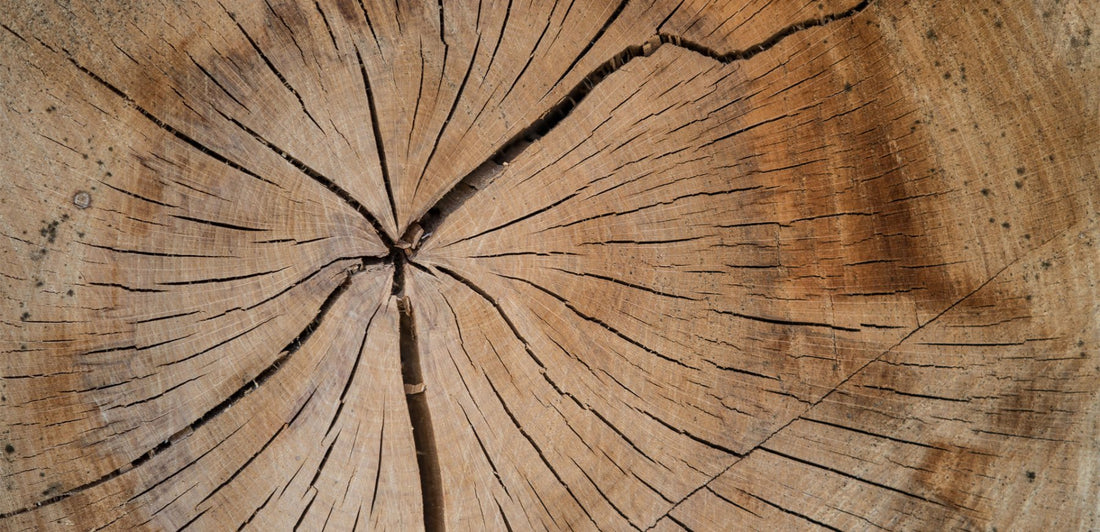TENCEL™ Lyocell is a groundbreaking fiber made by Austrian innovators, Lenzing AG. Popular the world over, it has revolutionised the sustainable fashion industry by facilitating a shift away from environmentally damaging materials like conventional cotton and fossil-fuel based polyester. TENCEL™ cellulosic fibers are famous for their silky texture, refreshing feeling, and low environmental impact.
But what, exactly, makes TENCEL™ Lyocell so sustainable? And how does TENCEL™ Lyocell feed into the circular economy? This article has both topics covered.
Why Is TENCEL™ Lyocell A Game-Changer?
Derives From A Renewable Resource
TENCEL™ Lyocell is made from wood chips, which are easily harvested and are sustainably sourced. This means that no old growth or endangered tree species are part of the TENCEL™ fiber manufacturing process, and that the raw material will continue to be regrown. Which stands in contrast to petroleum-based polymers that rely on a finite resource (oil or gas) to be made. At the sourcing stage, this can help to root out the most polluting elements of the fashion industry.
Sets The Bar For Closed Loop Systems
Lenzing earned a European Environment Award for their closed loop manufacturing system. Closed loop basically means that waste resources are fed back into the production system - to be used again and again. In the case of TENCEL™ Lyocell, 99.8% of the artificial solvents - used to break down the wood chips into pulp - are regenerated and reused inside Lenzing biorefineries. Impressively this is also true of Lenzing’s water use, which is continuously recycled.
TENCEL™ Lyocell leads the way in the textile industry, having shown how closed loop systems can benefit both the environment and economy.
Recycling Innovation
“What’s next for a better future? The answer lies in circularity, a core focus of the TENCEL™ brand.” So said the TENCEL™ team in a press release from 2022. Part of this drive toward circularity involves the use of innovative TENCEL™ Lyocell X REFIBRA™ technology - which turns cotton textile scraps from pre- and post-consumer waste into new TENCEL™ Lyocell fibers. It blends wood chips with cotton to create a cellulosic fiber of the same high standard as regular TENCEL™ Lyocell. Recycling - via REFIBRA™ technology - is a core way in which TENCEL™ has changed the game for fiber production. It shows a clear commitment to the Circular Economy.

What Is The Circular Economy?
The Ellen MacArthur Foundation is the go-to authority on the Circular Economy. They call it “an economy that is restorative and regenerative by design.” In many ways it is a reaction to the linear economic model that has led to global heating, oceanic pollution, and land degradation. This is known as the “take, make, waste” model, and it’s still the dominant way of doing business in the contemporary world.
The Circular Economy by contrast, advocates for a responsible use of resources - shifting away from finite to renewable - careful management of waste, and the constant reintegration of materials. In a Circular Economy everything is carefully connected and wired to ensure that one person’s waste is another person’s raw material.
Transitioning from single-minded to many-minded, single-use to re-use, the Circular Economy has three objectives -
1. Eliminate Waste And Pollution
The first principle of the circular economy involves overhauling the design of products to ensure that they can be recycled or reused (and therefore continue to be part of the circular economy!). It also relates to the way that the products are manufactured - designing out pollutive practices and focusing on regenerative ones.
TENCEL™ Lyocell have put this thinking into action through the safe treatment and recycling of water and solvents. Lenzing biorefineries also run on renewable energy. This in turn lowers the carbon footprint of TENCEL™ fibers and is one of the reasons they are considered to be carbon neutral.
The recyclability of TENCEL™ Lyocell has also been explored in the context of denim production. All TENCEL™ standard fibers are completely biodegradable in both marine and land conditions, so they don’t necessarily need to be recycled anyway. TENCEL™ Lyocell can be considered part of the “biological materials flow” in the butterfly diagram that’s often used by Circular Economists.
2. Circulate Products And Materials
This principle is mostly clearly demonstrated by TENCEL™ X REFIBRA™, and TENCEL™’s broader commitment to recycling. By giving cotton waste scraps a second chance, TENCEL™ is contributing to the circular economy. And yet, there’s more to this second principle than just recycling - it’s also important to make sure that the final product lasts a long time. TENCEL™ fibers are stronger than regular cellulosic fibers, improving each garment’s lifespan.
3. Regenerate Nature
This circular economy principle is perhaps the most poetic - and important. The idea is to give back to nature, helping ecosystems to recover from centuries of exploitation and destruction. In the long-run, the Circular Economy hopes to be of net benefit to the environment.
Meanwhile, TENCEL™ Lyocell is “integrated into nature’s cycle”, because it comes from a renewable natural material and can return to the soil to biodegrade. In Brazil, Lenzing’s plantation partners have set up biodiversity corridors to make sure that, far from disrupting nature, they allow thousands of species to flourish. In addition, for every tree that is cut down, a new one is planted. By working exclusively with responsible plantations, Lenzing supports nature’s regeneration.
Conclusion
There are many ways in which sustainably produced TENCEL™ Lyocell is a game-changer for the Circular Economy. Lenzing’s commitment to increased circularity is also one to watch, and will likely spawn new innovations in the wood-based fibre sector. We’re proud to partner with TENCEL™ Lyocell, and to craft many different slow fashion styles from this fabulous fiber.
TENCEL™ and REFIBRA™ are trademarks of Lenzing AG.









